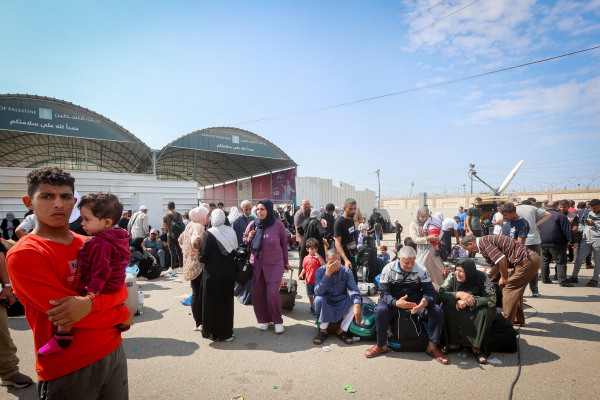Efforts by the United States and the European Union to persuade Egypt through the offer of debt relief, in return for allowing the reopening of the Rafah crossing, have not yielded positive results thus far.
By Batya Jerenberg
As Israel’s war against the Hamas terrorist organization in the Gaza Strip intensifies, government officials have been talking with several countries about getting Egypt to agree to take in Gazan refugees, at least temporarily.
The Rafah border crossing to Egypt from the southern edge of the Strip is the only one that is even partially functioning ever since Israel declared war following the Hamas massacre on October 7 of 1,400 men, women, and children in the Gaza envelope, and took over 240 hostages.
While trucks carrying humanitarian aid have entered Gaza through this opening, hundreds of thousands of Palestinians have moved southward, near the border with Egypt, in the hopes of fleeing the embattled coastal enclave.
Just six days into the war, Israel’s Intelligence Ministry put forth a proposal to transfer Gaza’s entire population out of the Strip, via Egypt.
In the first stage, the Gazan civilian population would be moved first to tent cities that would be set up in Egypt’s Sinai Peninsual, and then to permanent housing in Egypt – with the possibility of emigrating from Egypt to other Arab countries at a later date.
Since the Sinai abuts Israel along a long border, the IDF would establish a security zone to stop Palestinians from entering the Jewish state.
The “concept paper,” described by the government as being hypothetical, also suggested that the Gazans would not necessarily have to stay in Egypt. Countries in the region such as the UAE, Qatar, Saudi Arabia and Turkey could take them in, and/or help finance their resettlement. The U.S. and Canada were also suggested as financial backers or destinations.
On October 18 President Abdel Fattah el-Sisi rejected the idea of taking in Palestinians en masse, saying it was an attempt to “liquidate” the Palestinian cause and would eventually cause a war as Jerusalem would blame Cairo for Palestinian terrorist attacks which would be launched from the Sinai instead of from Gaza.
Another fear went unstated – that among the refugees would be Hamas operatives whose extremist ideological roots are in the Moslem Brotherhood, which Egypt has long outlawed, and they would destabilize his country.
El-Sisi countered that Israel should move the Arab refugees to the Negev until its war against Gaza’s Hamas rulers is over. Bringing a huge enemy population into Israel is, obviously, a complete non-starter.
The United States and European Union have also pressed President Abdel Fattah el-Sisi to host Gazan civilians. They have reportedly offered that the World Bank would forgive a large portion of Egypt’s sovereign debt as an incentive. Egypt is supposed to pay $14.59 billion in external debt service in the first half of 2024, and Bloomberg Economics ranks the country as second only to Ukraine among countries most vulnerable to missing debt payments due to the poor state of its economy.
Although this might seem a very appealing enticement, especially as Egyptian elections loom in two months, el-Sisi has withstood the temptation so far to go for the money. Being possibly seen by the Arab street as a betrayer of the Palestinians is seemingly the far bigger risk for the Egyptian president than being in financial straits.
Israel at War with Hamas. Support Israel Today!
The people of Israel need your help at this most critical time. Please make a donation to help protect and defend Israelis against unprecedented Hamas terror.
Rockets are falling. Sirens blare, with seconds to run for cover. IDF soldiers risk their lives battling terrorists inside Gaza. Thousands forced to abandon their homes in southern Israel.
To fight terror and save lives, UWI provides bomb shelters, anti-terror vehicles, protective gear, security equipment, medical assistance, relief to victims and much more. Help Israel fight and win this war against Hamas. The time to act is now!
